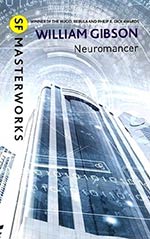
![]() JohnBem
JohnBem
4/9/2016
![]()
I read Neuromancer at least one other time in my life, sometime in the 1980s, probably sometime after 1983 and before 1989. I don't really consider this a re-read, though, because at 25-30 years out from that first time I cracked open the covers of this book (and I think I bought it new, and I think the copy I have is that same one, which is a 1986 seventh printing, so that may be the year I read it), I don't have much recollection of it, beyond the fact that I thoroughly enjoyed it.
And now, in the shiny and new(ish) 21st Century, I thoroughly enjoyed the book all over again. Even though, I've got to admit, I've got no fully formed idea of just what was the plot of Neuromancer. It has something to do with data-cowboys and cyber-ninjas who interface with virtual reality and hijack and steal software programs. It has something to do with warring AIs. Classism is in there, I think, and perhaps a bit of commentary on corporate oligarchies. Ultimately, however, I didn't mind that the purposes and outcome of the novel were unclear to me. That's because the prose is so snappy, dense, picturesque, and evocative, I felt fully immersed in the world of Neuromancer, so much so that I was perfectly happy to just hang on and go along for the ride, despite the fact that the destination was indistinct.
The primary protagonists of the novel, Case and Molly, are well-drawn and fully memorable. Other characters come and go with such great frequency and density that when they reappeared, I sometimes had to wrack my brain and flip backward through the book to remember just who they were. For me, the most outstanding and memorable secondary character was Maelcum, inhabitant of a space-station Zionist enclave and shotgun-toting self-proclaimed member of the Rastafarian Navy. But again, these minor deficiencies did not detract from my overall enjoyment of the book.
Neuromancer reads like a fast-paced crime noir thriller (the purpose of almost every character in the book is, I think, a scam or heist of some sort) thickly overlaid with many fascinating and provocative sci-fi ideas. For me, it's not the story so much as the writing, which I think is mostly excellent. I'm a sucker for good and beautiful writing that fills one's mind with vivid and strange images and ideas, and Neuromancer does just that. For me it was admittedly tricky to tease out all (or even most) of the threads of the labyrinthine plot, but that was only a secondary and small problem because the lush writing outweighed my concerns in that area. In my final estimation, then, Neuromancer is a very good book, despite some limitations (and those limitations may actually exist in the brain of this reader, not in the pages of the novel), definitely worth reading and re-reading.